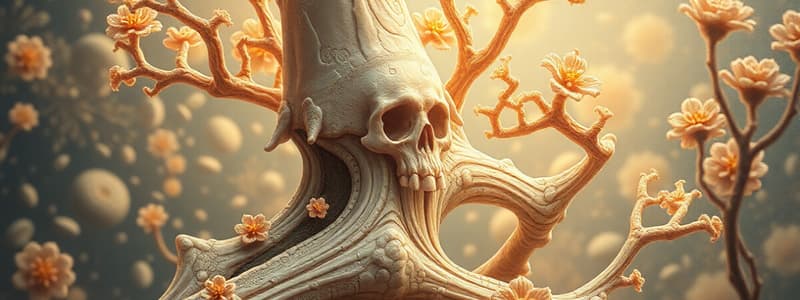Podcast
Questions and Answers
What is the primary process by which bones grow longer?
What is the primary process by which bones grow longer?
- Calcification
- Longitudinal growth (correct)
- Resorption
- Appositional growth
What role do osteoblasts play in bone growth?
What role do osteoblasts play in bone growth?
- They secrete osteoid and increase deposition (correct)
- They increase metabolic activity
- They secrete acids for bone resorption
- They develop resorption pits
Which vitamin is particularly important for bone growth and health?
Which vitamin is particularly important for bone growth and health?
- Vitamin C
- Vitamin A
- Vitamin D (correct)
- Vitamin E
What is the role of calcitonin in bone metabolism?
What is the role of calcitonin in bone metabolism?
What effect does growth hormone have on bone growth?
What effect does growth hormone have on bone growth?
What is resorption in the context of bone growth?
What is resorption in the context of bone growth?
Which mineral is NOT essential for bone growth?
Which mineral is NOT essential for bone growth?
Which condition would likely result from an excess of parathormone?
Which condition would likely result from an excess of parathormone?
Flashcards
Longitudinal Bone Growth
Longitudinal Bone Growth
The process of bone growth in length, occurring at the epiphyseal plate, a region of cartilage where new bone cells are formed.
Appositional Bone Growth
Appositional Bone Growth
The process of bone growth in width, involving osteoblasts adding matrix to the outer surface faster than osteoclasts remove it.
Bone Deposition
Bone Deposition
The formation of new bone tissue, involving the deposition of mineral salts and collagen fibers.
Bone Resorption
Bone Resorption
Signup and view all the flashcards
Calcitonin
Calcitonin
Signup and view all the flashcards
Parathyroid Hormone (PTH)
Parathyroid Hormone (PTH)
Signup and view all the flashcards
Piezoelectric Effect
Piezoelectric Effect
Signup and view all the flashcards
Osteon
Osteon
Signup and view all the flashcards
Study Notes
Bone Growth and Development
- Longitudinal Growth: Bones lengthen at the epiphyseal plate.
- Appositional Growth: Bones widen as osteoblasts add bone matrix faster than osteoclasts remove it.
Bone Deposition
- Process: Osteoblasts form osteoid, which hardens with calcium salts.
- Steps:
- Osteoblast development
- Osteoid secretion
- Calcification of osteoid
Bone Resorption
- Process: Bone matrix breaks down, releasing minerals into the blood.
- Steps:
- Osteoclast development
- Acid and enzyme secretion
- Resorption pit (Howship's lacunae) formation
Factors Affecting Bone Growth
- Proteins: Essential for structure and function.
- Minerals: Calcium, phosphorus, and sulfur are crucial.
- Vitamins: Vitamins C and D are vital.
- Growth Hormone: Stimulates chondrocytes at epiphyseal plates.
- Thyroxine: Increases cell metabolic rate.
- Sex Hormones: Influence bone growth and maturation.
Bone Growth Regulation: Hormones
- Growth Hormone (GH): Promotes osteoblastic activity, leading to increased deposition.
- Calcitonin: Regulates blood calcium levels by increasing deposition and decreasing resorption.
- Parathyroid Hormone (PTH): Regulates blood calcium levels, indirectly affecting resorption and deposition.
- Important note: PTH (parathyroid hormone) is closely linked to calcium regulation, influencing resorption rates.
Bone Structure and Components
- Osteons: Units of compact bone (include lamellae, canaliculi, and central canal)
- Trabeculae: Supporting structures in spongy bone.
- Lamellae: Concentric rings of bone matrix.
- Canaliculi: Tiny canals connecting osteocytes.
- Central Canal: Has blood vessels and nerves.
Factors Affecting Bone Growth (Summary)
- Proteins, Minerals (calcium, phosphorus, sulfur), Vitamins (C&D), Growth Hormone, Thyroxine, Sex Hormones are all influencing factors.
Bone Growth Mechanisms (Summary)
- Intramembranous ossification
- Endochondral ossification
- Growth plates are vital for bone growth.
- Bone matrix has organic and inorganic parts.
Bone Cell Activities
- Osteoclasts: Increase bone resorption.
- Osteoblasts: Secrete osteoid, increasing bone deposition.
Studying That Suits You
Use AI to generate personalized quizzes and flashcards to suit your learning preferences.


